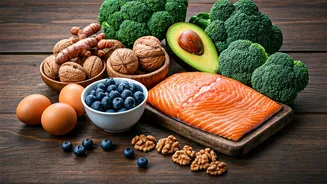Blueberries: Brain Boosters
Blueberries are more than just a tasty snack; they are a powerhouse of antioxidants, specifically anthocyanins. These compounds are renowned for their
ability to protect brain cells from damage caused by oxidative stress. As we age, our brains are susceptible to oxidative damage, which can lead to memory decline. Regularly consuming blueberries can counteract this process, effectively slowing down cognitive decline. Studies have shown that blueberries improve memory and learning. Consider adding them to your morning cereal, blending them into a smoothie, or simply enjoying them as a quick and healthy treat to fortify your mind. They are also easy to find in local markets.
Fatty Fish: Omega Power
Fatty fish, such as salmon, tuna, and mackerel, are brimming with omega-3 fatty acids, which are critical for brain health. These essential fats are structural components of brain cells, supporting their integrity and functionality. Omega-3s also possess anti-inflammatory properties, reducing inflammation that can impair cognitive function. The brain uses these healthy fats to build brain and nerve cells, and these fats are essential for learning and memory. Regular consumption of fatty fish can significantly enhance memory and cognitive performance. If you are not a fan of fish, consider fish oil supplements, which provide a convenient way to reap the benefits of omega-3 fatty acids.
Dark Chocolate: Cocoa Magic
Dark chocolate, particularly that with a high cocoa content, is loaded with flavanols, a type of antioxidant. Flavanols increase blood flow to the brain, which is essential for optimal brain function. Improved blood flow delivers oxygen and nutrients to the brain cells, promoting enhanced cognitive performance and memory. Consuming dark chocolate has also been linked to improved mood and focus, factors that indirectly support memory function. Opt for dark chocolate with at least 70% cocoa for maximum benefits, and enjoy it in moderation. A small square of dark chocolate can be a delicious and brain-boosting treat to add to your daily routine. Remember to eat it in moderation for best results.
Nuts and Seeds: Brain Fuel
Nuts and seeds are excellent sources of vitamin E, which acts as a powerful antioxidant protecting brain cells from oxidative stress. Vitamin E helps protect against age-related cognitive decline. Walnuts, almonds, and sunflower seeds are particularly rich in this crucial nutrient. Additionally, nuts and seeds contain healthy fats, which are vital for brain cell structure and function. They are also packed with antioxidants and vitamin E that help protect the brain from cell damage. These healthy fats support cognitive function and memory. Keep a mix of nuts and seeds handy for a quick and brain-friendly snack to have throughout the day. A handful of mixed nuts can be a very efficient and tasty way to improve memory.
Avocados: Healthy Fats
Avocados are rich in monounsaturated fats, which promote healthy blood flow to the brain. Proper blood flow is crucial for delivering oxygen and nutrients to the brain, which supports cognitive function and memory. These creamy fruits also contain antioxidants that protect brain cells from damage. The healthy fats in avocados contribute to the overall structure of brain cells, supporting their optimal performance. Including avocados in your diet can support brain health, enhance cognitive function, and improve memory. Whether spread on toast, added to salads, or blended into smoothies, avocados are a versatile and brain-boosting food, easily incorporated into meals.
Whole Grains: Steady Energy
Whole grains provide a steady release of glucose, the brain's primary energy source. They help maintain stable blood sugar levels, preventing the energy crashes that can impair cognitive function. Stable energy levels are critical for maintaining focus, attention, and memory. Foods like brown rice, oats, and quinoa are excellent choices. They also offer fiber, which further supports brain health by promoting gut health. Consuming whole grains can improve cognitive performance and prevent cognitive decline. Start your day with a bowl of oatmeal or incorporate brown rice into your lunch to provide the brain with a sustained energy source throughout the day. This stable energy supply is essential for overall brain health.
Coffee and Tea: Alertness Boost
Both coffee and tea contain caffeine, a stimulant that can enhance alertness, focus, and memory. Caffeine blocks adenosine, a neurotransmitter that promotes sleepiness, thereby boosting cognitive function. Both coffee and tea also contain antioxidants, which support overall brain health. Coffee and tea can improve cognitive performance and memory. Caffeine is most effective in short doses and can be most effective during periods of high concentration or studying. Caffeine can significantly boost alertness. However, be mindful of your caffeine intake, as excessive consumption can lead to anxiety and disrupt sleep patterns. The right amount can provide a mental boost.
Broccoli: Vitamin K Power
Broccoli is rich in vitamin K, which is essential for cognitive function and memory. Vitamin K is involved in the formation of sphingolipids, which are critical components of brain cells. This process is important in maintaining brain health and optimal cognitive performance. Broccoli also contains antioxidants that protect the brain from oxidative stress. Regularly consuming broccoli can help enhance memory and cognitive function. Incorporate it into your diet by steaming, roasting, or adding it to salads and stir-fries. Broccoli also provides fiber, which supports overall gut health, indirectly benefiting brain function. It can be a very versatile addition to various meals.
Eggs: Choline Champion
Eggs are a good source of choline, a nutrient crucial for brain health. Choline is used by the body to produce acetylcholine, a neurotransmitter that plays a vital role in memory and communication between brain cells. Choline supports memory and cognitive function. Eggs also provide protein and other essential nutrients that support overall brain health. Incorporating eggs into your diet can help enhance memory and cognitive performance. Scramble them for breakfast, hard-boil them for a snack, or add them to salads. Eggs are a convenient and nutritious way to boost brain health and function. For optimum results, eat eggs daily as part of your balanced diet.
Turmeric: Curcumin's Benefit
Turmeric contains curcumin, a powerful antioxidant and anti-inflammatory compound. Curcumin is believed to cross the blood-brain barrier and directly benefit brain cells. It has potent anti-inflammatory properties, reducing inflammation that can impair cognitive function and memory. Curcumin also boosts the brain's antioxidant capacity, protecting against damage. Regular consumption of turmeric may improve memory and cognitive function. It can be added to curries, stews, and smoothies or taken as a supplement. Using turmeric in cooking can be an easy way to incorporate this beneficial spice into your daily routine and improve brain function. Turmeric is also a natural anti-inflammatory agent and can add great flavor to any meal.





















